Other events/Další akce
Maths competition at ISP

Other events/Další akce
Maths competition at ISP
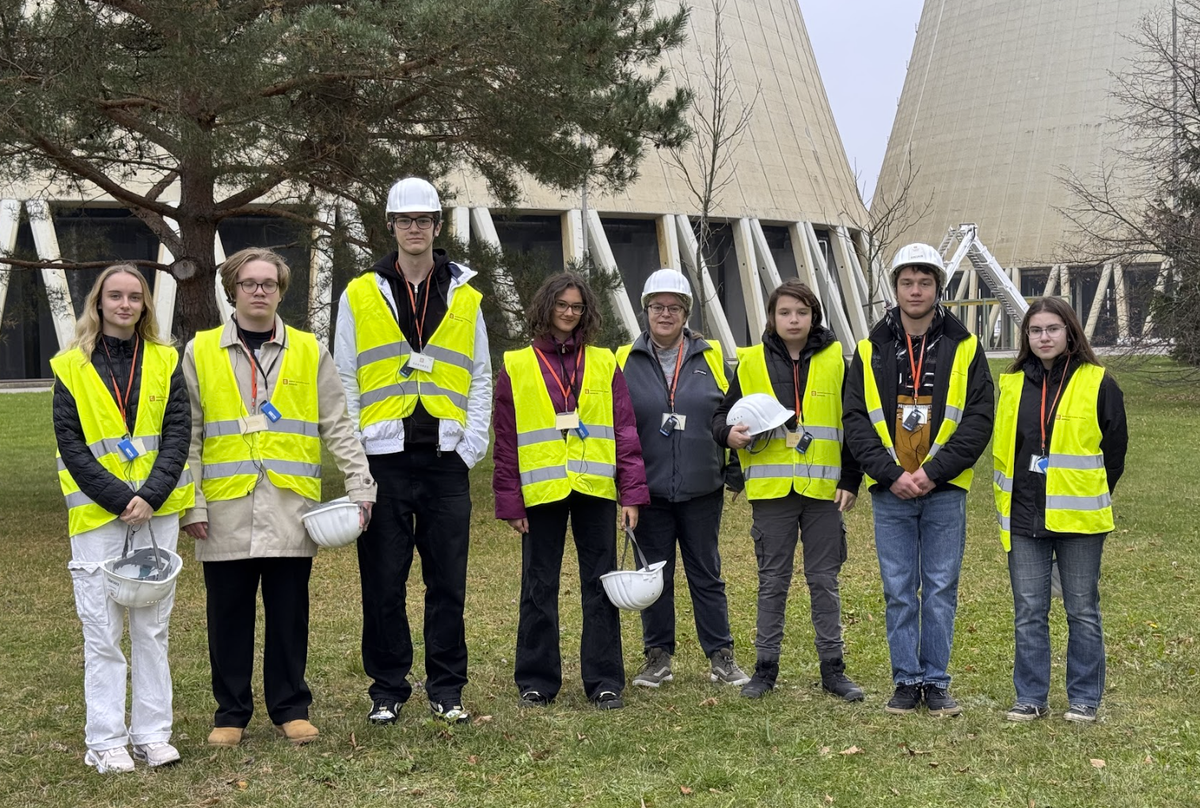

The visit to Temelín, one of two nuclear power plants located in the Czech Republic, was a very intriguing experience. Firstly, we were briefed about the basic mechanics of the electricity production and the individual parts of the power plant which was helpful later during the tour and for revising our Physics knowledge. After that, we were let into the compound where we were introduced to the meticulous security procedures that the power plant has to implement in order to put safety first. Next, we were able to walk with a guide around the exteriors of the power plant and even saw the 155-meter tall water cooling towers close up, which was fascinating.
Continuing further, we were very privileged to visit the actual insides of the power plant where we could look at the massive turbine and generator in action. It was mesmerising to see such complicated and huge engineering marvels working and, combined with the perfectly detailed information provided by the guide it created the best possible experience.
As a cherry on top, we were subsequently given virtual reality glasses which enabled us to look at areas that are not available to the public at all, such as the nuclear reactor. We could also see the monumental cooling towers from a drone-like perspective which was also really interesting.
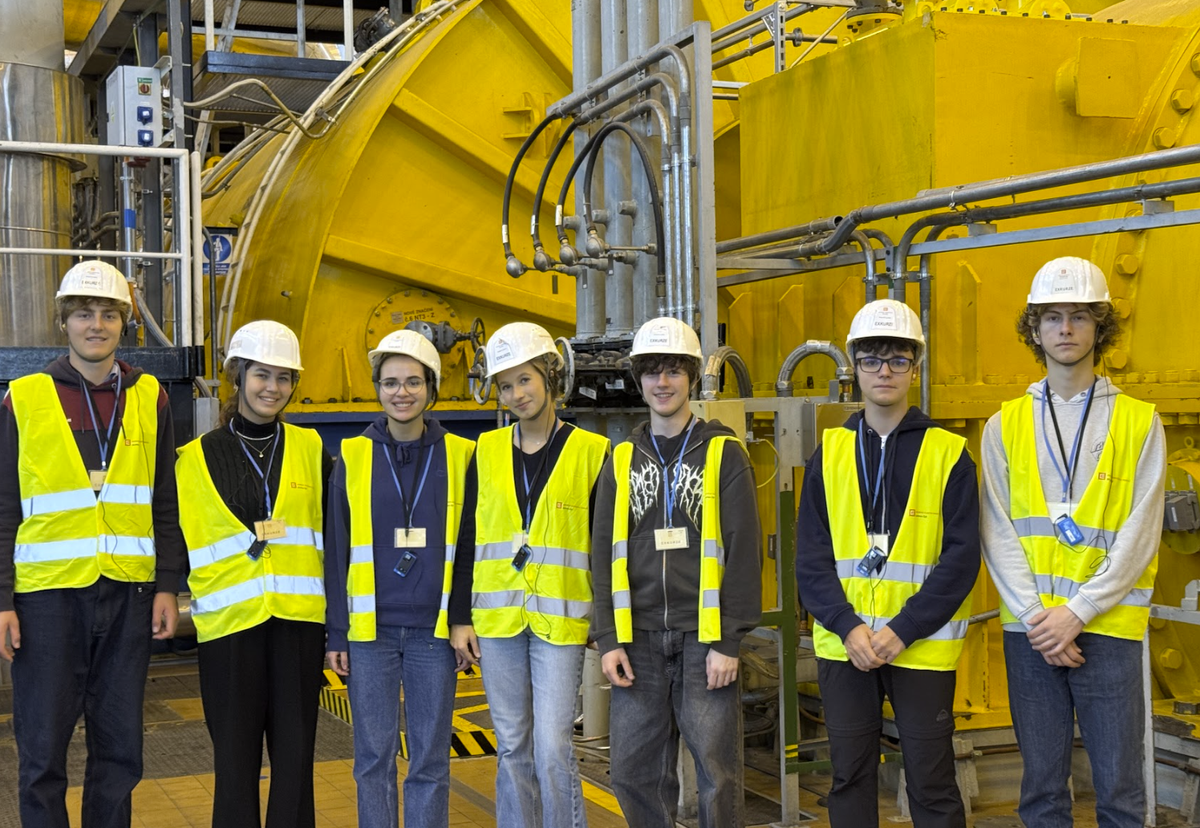

Additionally, we visited a water power plant also owned by ČEZ, which gave us further information on how it works and how the water is delivered to the power plant.
Overall, this was a great opportunity to really grasp how the power plants work and the physics behind them. The very detailed information that we have received together with the privilege of going inside the power plant made this an enriching and valuable experience.
Tomáš Mašovský, Year 5
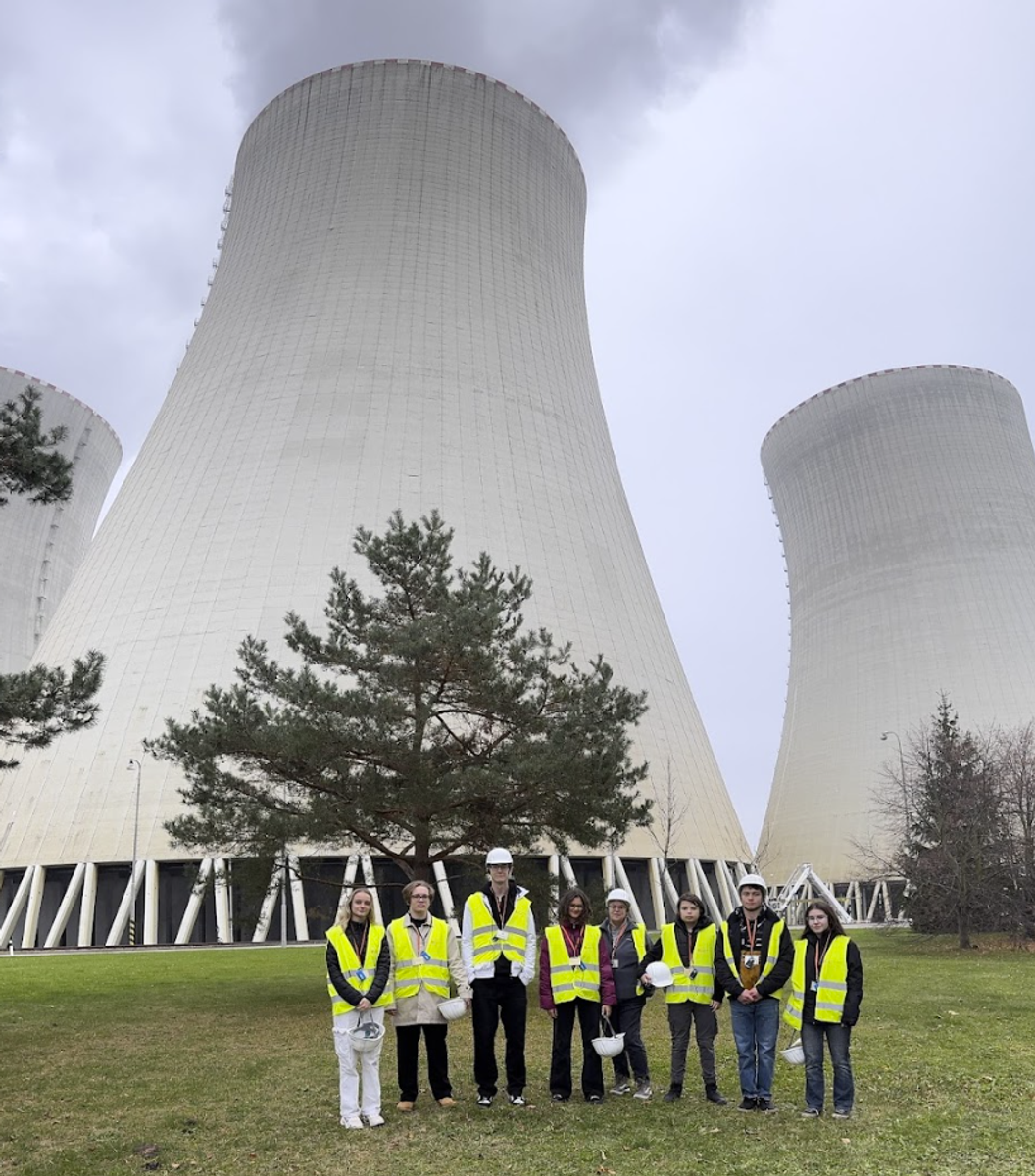

Návštěva Temelína, jedné ze dvou jediných jaderných elektráren v České republice, byla velmi zajímavým zážitkem. Nejprve jsme byli seznámeni se základní mechanikou výroby elektřiny a jednotlivými částmi elektrárny, což bylo užitečné později při prohlídce a pro opakování našich fyzikálních znalostí. Poté jsme byli vpuštěni do areálu, kde jsme byli seznámeni s pečlivými bezpečnostními postupy, které musela elektrárna zavést, aby byla bezpečnost na prvním místě. Dále jsme se mohli s průvodcem projít po exteriérech elektrárny a dokonce jsme zblízka viděli 155 metrů vysoké vodní chladicí věže, což bylo pozoruhodné. Když jsme pokračovali dále, měli jsme velkou čest navštívit i útroby elektrárny, kde jsme se mohli podívat na mohutnou turbínu a generátor v akci. Bylo fascinující vidět pracovat tak komplikované a obrovské technologické divy a v kombinaci s podrobnými informacemi poskytnutými průvodcem to vytvořilo ten nejlepší možný zážitek.
Třešničkou na dortu poté bylo použití brýlí pro virtuální realitu, které nám umožnily podívat se do oblastí, které nejsou veřejnosti vůbec dostupné, jako je například jaderný reaktor. Také jsme mohli vidět monumentální chladicí věže z ptačí perspektivy, což bylo také opravdu skvělé. Dále jsme navštívili vodní elektrárnu, rovněž v majetku ČEZ, která nám poskytla další informace o tom, jak výroba funguje a jak se voda do elektrárny dodává.
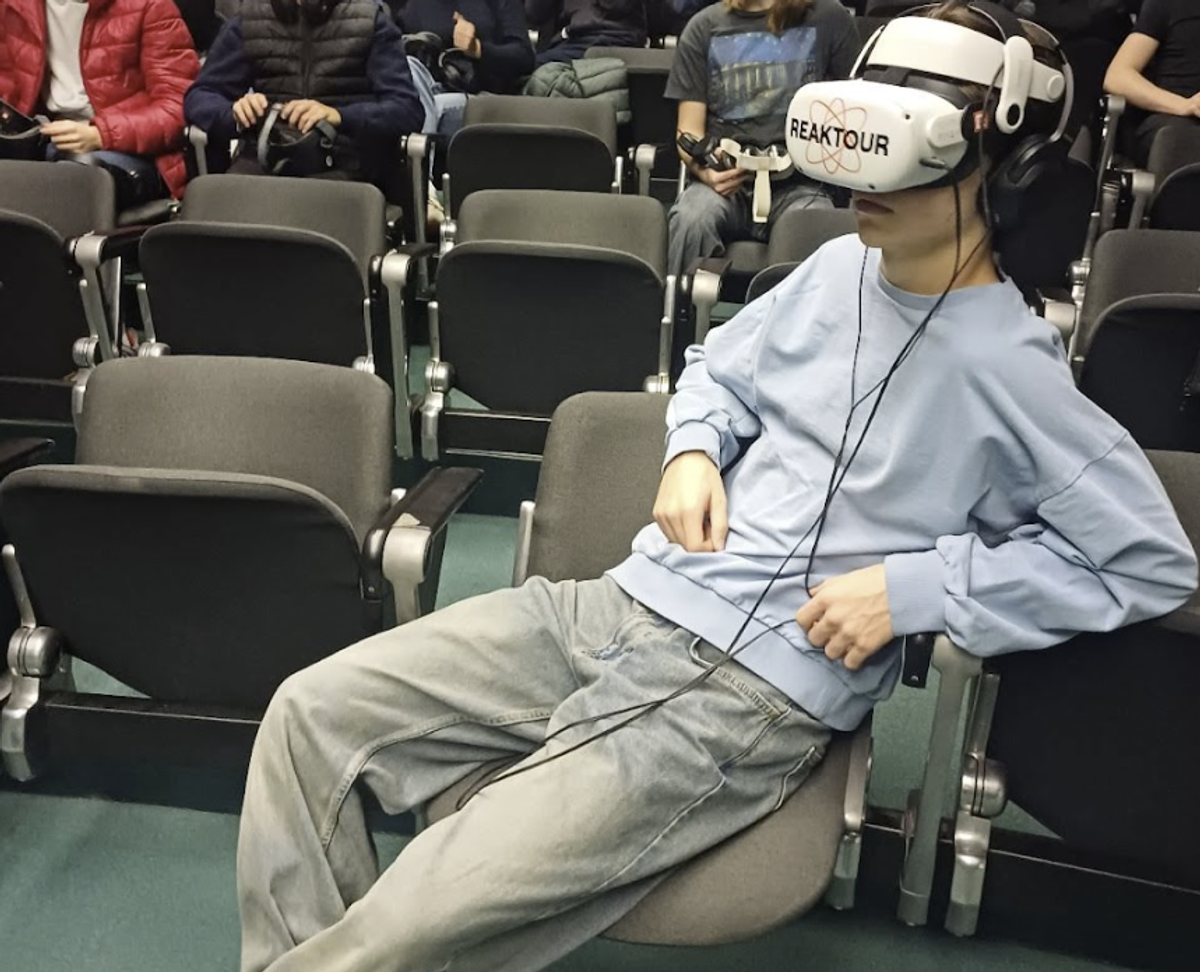

Celkově byl výlet skvělou příležitostí skutečně pochopit, jak elektrárny fungují a jak se v nich uplatňuje fyzika. Velmi podrobné informace, které jsme obdrželi, spolu s privilegiem vstoupit do útrob elektrárny, z akce učinily velmi obohacující a cennou zkušenost.
Tomáš Mašovský, 5. ročník
The winner of the school round of the Czech Linguistic Olympiad is Alex Howell with an amazing 83 points, followed by Alex Hanzal with 73 at second place and Annáš Rychtera with 68 points at the third place. Congratulations.
Vítězem školního kola soutěže Česká lingvistická olympiáda je Alex Howell s úžasnými 83 body. Na druhém místě se umístil Alex Hanzal se 73 body a třetím místě Annáš Rychtera s 68 body. Gratulujeme.
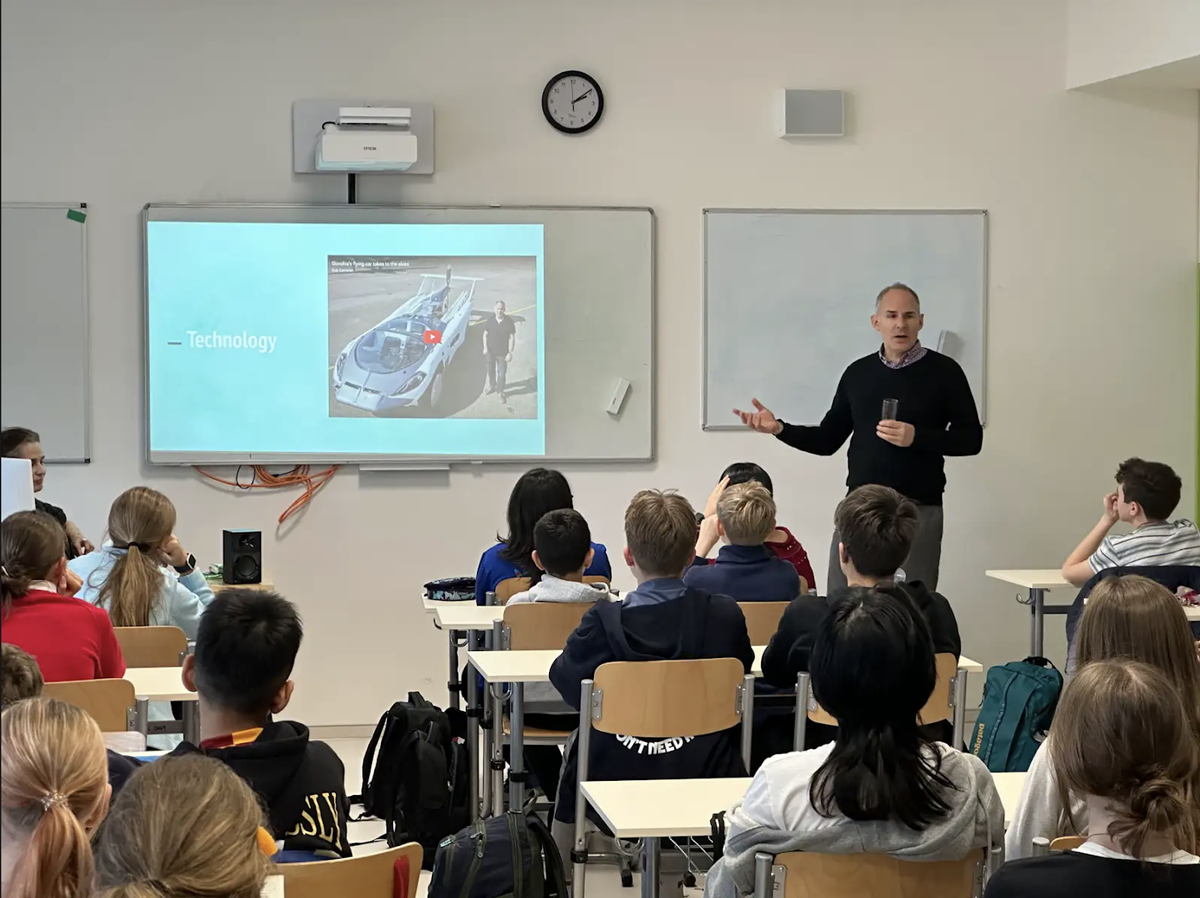

On the 26th of November during the community building afternoon, the entire year 1 attended a journalism workshop. The workshop was led by Rob Cameron, who is a BBC freelance journalist. Some of the topics that he covered were: the Chatham House rule, famous people he interviewed, politics, general news, technology, Ukraine war and what his job entails.
Due to his work Rob Cameron has had the chance to interview the current Czech president, Petr Pavel, and the previous Slovak president, Zuzana Čaputová. Mr. Cameron told us about the three topics he usually covers (politics, general news and technology) and he showed us videos from his most memorable stories under these topics. The biggest and most important story he took part in was the start of the Ukrainian war, when refugees were fleeing to the Slovak borders. One of the main factors of being a BBC journalist is staying impartial at all times.
The whole of Year 1 was grateful that they were able to learn about being a journalist, since our unit 2 topic was journalism. We also got to ask Mr. Cameron questions about his profession. Later on, he commented that the questions we asked were better than that of university students.
Christina Mruck and Ella Skokanová, Year 1
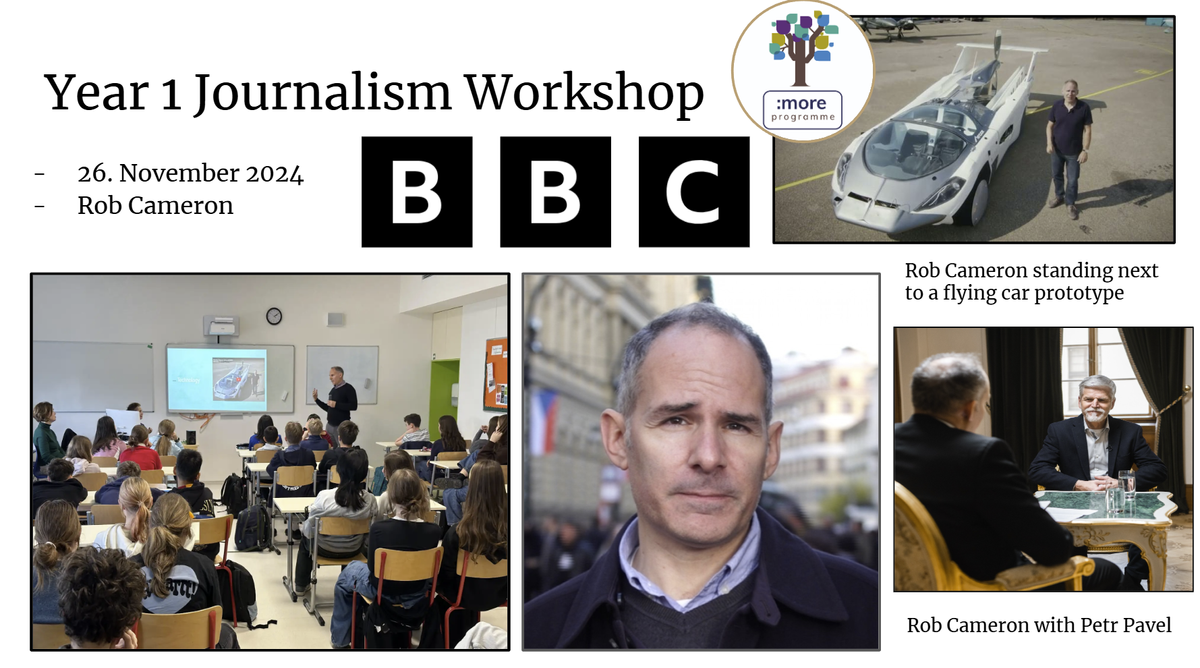

26. listopadu se v rámci komunitního odpoledne celý 1. ročník zúčastnil novinářského workshopu. Workshop vedl Rob Cameron, který je novinářem BBC na volné noze. Témata, který zmínil, zahrnovala pravidlo Chatham House, slavní lidé, se kterými dělal rozhovory, politika, obecné zprávy, technologie, válka na Ukrajině a co všechno jeho práce obnáší.
Rob Cameron měl díky své práci možnost vyzpovídat současného českého prezidenta Petra Pavla a předchozí slovenskou prezidentku Zuzanu Čaputovou. Pan Cameron nám řekl o třech tématech, kterými se obvykle zabývá (politika, obecné zprávy a technologie), a pod těmito tématy nám ukázal videa ze svých nejpamátnějších příspěvků. Největší a nejdůležitější příběh, na kterém se podílel, byl začátek ukrajinské války, kdy uprchlíci utíkali ke slovenským hranicím. Jedním z hlavních faktorů, který musí novinář BBC splňovat, je zůstat za všech okolností nestranný.
Studenti 1. ročníku byli vděční, že se mohli dozvědět více o novinařině, protože druhým blokem v jejich učivu byla právě žurnalistika. Také jsme měli možnost zeptat se pana Camerona na jeho profesi. Později poznamenal, že otázky, které jsme mu kladli, byly lepší než ty, které mu pokládali vysokoškoláci.
Christina Mruck and Ella Skokanová, Year 1
Year 3 and 4 students recently competed against other schools in Prague in the inaugural Mathematics Derby held at ISP. The competition was attended by students from 4 different international schools: Riverside, Park Lane, ISP, and ECP. Students from each academic institution had to compete in three challenges.
The first one was an individual UKMT-based paper, with twenty questions of gradually increasing difficulty. A correct answer was worth 3 points and a mistake would deduct 1 point from the total balance (this was implemented to discourage guessing). While the problems were not too complicated, they forced the student to recall materials learnt in maths classes. Solving more practice UKMT papers should be a substantial help for anyone interested in participating. The second activity was called "the passback round" which consisted of exercises split into two pairs of students. One pair of students had questions such as Q1 and Q3 and the other pair Q2 and Q4. They had one answer sheet that was passed. The first pair with the first question answered it and passed the answer sheet so the other pair could use the answer to calculate their next answer and then they passed it back. It required a lot of teamwork and trust to solve the questions. The questions also got progressively harder! The third and final round was the relay race. This was another series of questions in order and one person had to run to get the next question if you got the initial one correct. To skip it you would need to run another lap to get the question. The team had to work together to solve the questions. To win you needed to answer the most questions correctly, therefore scoring the most points. There was a lot of excitement (and one or two skinned elbows!) in this final round.
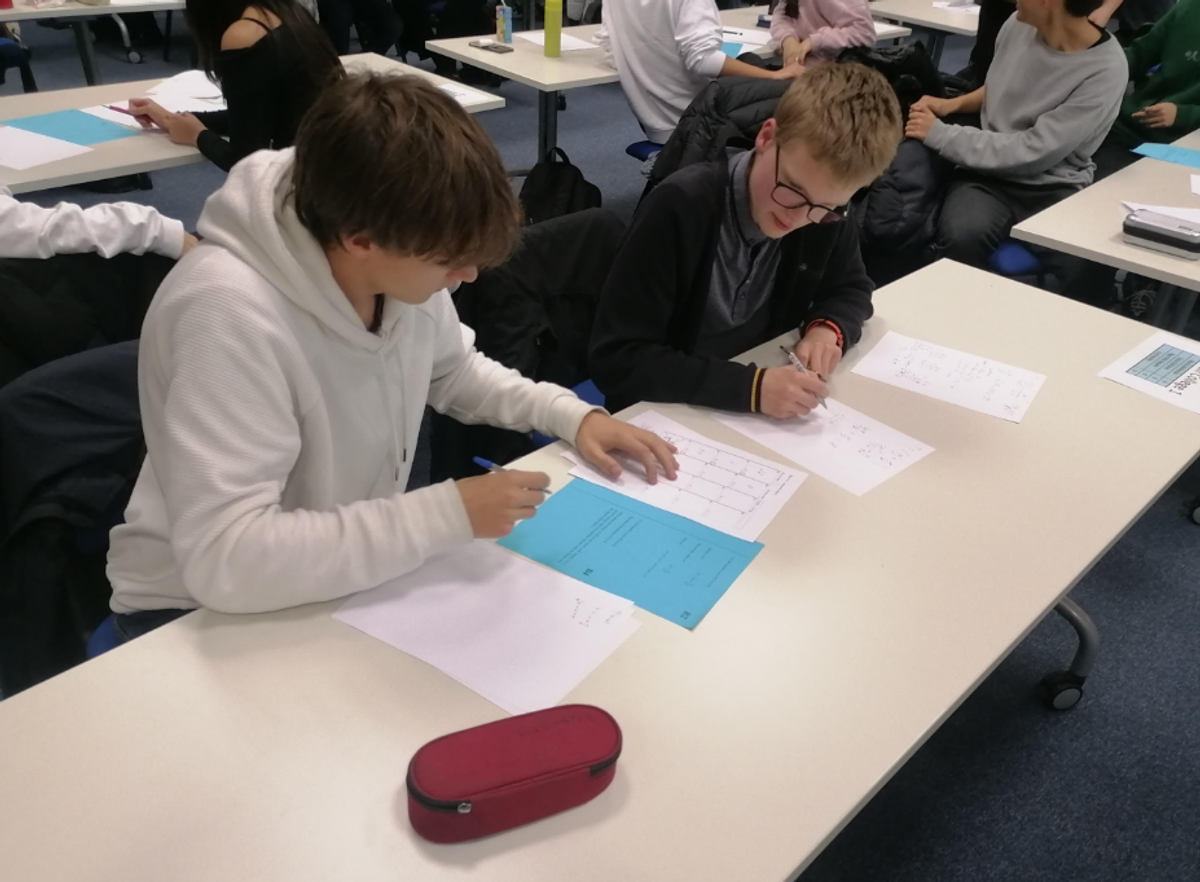

Gajus in Year 3, described the competition as "certainly a good way to spend one’s evening" and that even if you don't have much experience in competing, everything is worth a try! Mai (also Year 3) writes that the ISP Math competition showed me how teamwork is crucial when it comes to group exercises. It had exercises where you needed teamwork to complete questions. Without it, it is impossible to do. The exercises they gave us, allowed us to connect our minds to solve them because they weren't based on skill but logic. Overall, it was worth participating in!
Year 3 students
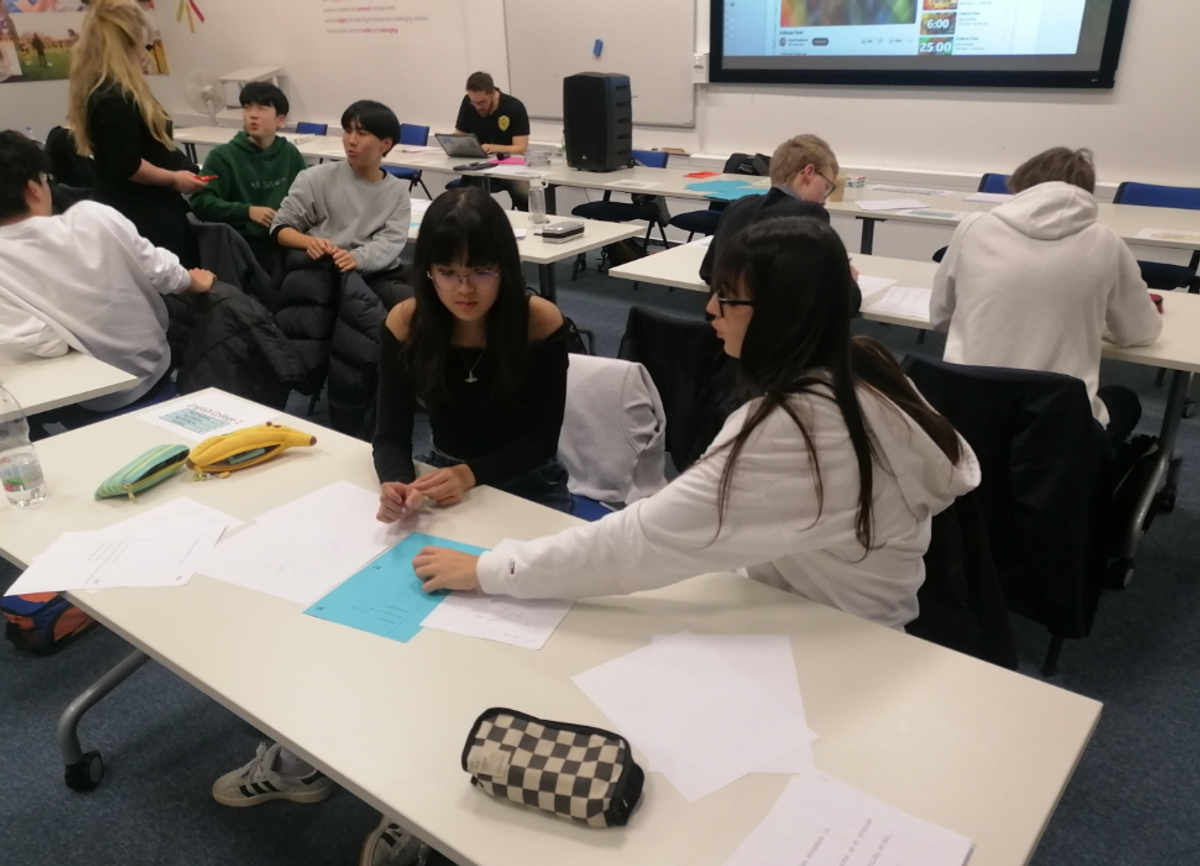

Studenti 3. a 4. ročníku se nedávno utkali s ostatními školami v Praze v inauguračním matematickém derby, které se konalo v ISP. Soutěže se zúčastnili studenti ze 4 různých mezinárodních škol: Riverside, Park Lane, ISP a ECP. Studenti z každé instituce museli soutěžit ve třech výzvách.
První byl samostatný dokument založený na britské soutěži UKMT s dvaceti otázkami s postupně se zvyšující obtížností. Správná odpověď měla hodnotu 3 bodů a chyba by odečetla 1 bod z celkového zůstatku (což bylo implementováno, aby se zabránilo odhadům). I když úlohy nebyly příliš složité, nutily studenta, aby si vybavil materiály naučené v hodinách matematiky. Řešení dalších praktických úkolů souvisejících s UKMT by mělo být významnou pomocí pro každého, kdo má zájem se této soutěže zúčastnit. Druhá aktivita se nazývala „passback round“ a zahrnovala cvičení rozdělená do dvou dvojic studentů. Jedna dvojice měla otázky Q1 a Q3 a druhá Q2 a Q4. Jeden odpovědní list byl sdílen. První dvojice s první otázkou na ni odpověděla a předala odpovědní arch, aby druhá dvojice mohla odpověď použít k výpočtu své další odpovědi, a poté ji předala zpět. Řešení otázek vyžadovalo hodně týmové práce a důvěry. Otázky byly také postupně těžší a těžší. Třetím a posledním kolem byla štafeta, která přinesla další sérii otázek v pořadí a jeden člověk musel běžet, aby dostal další otázku, pokud byla předešlá odpověď správná. Pokud byste chtěli otázku přeskočit, museli byste uběhnout další kolo, abyste dostali novou otázku. Tým musel při řešení otázek spolupracovat. Vítězem se stal ten, kdo správně odpověděl na největší množství otázek, a tak získal nejvíce bodů. Toto finálové kolo bylo plné vzrušení (i menších rozepří).
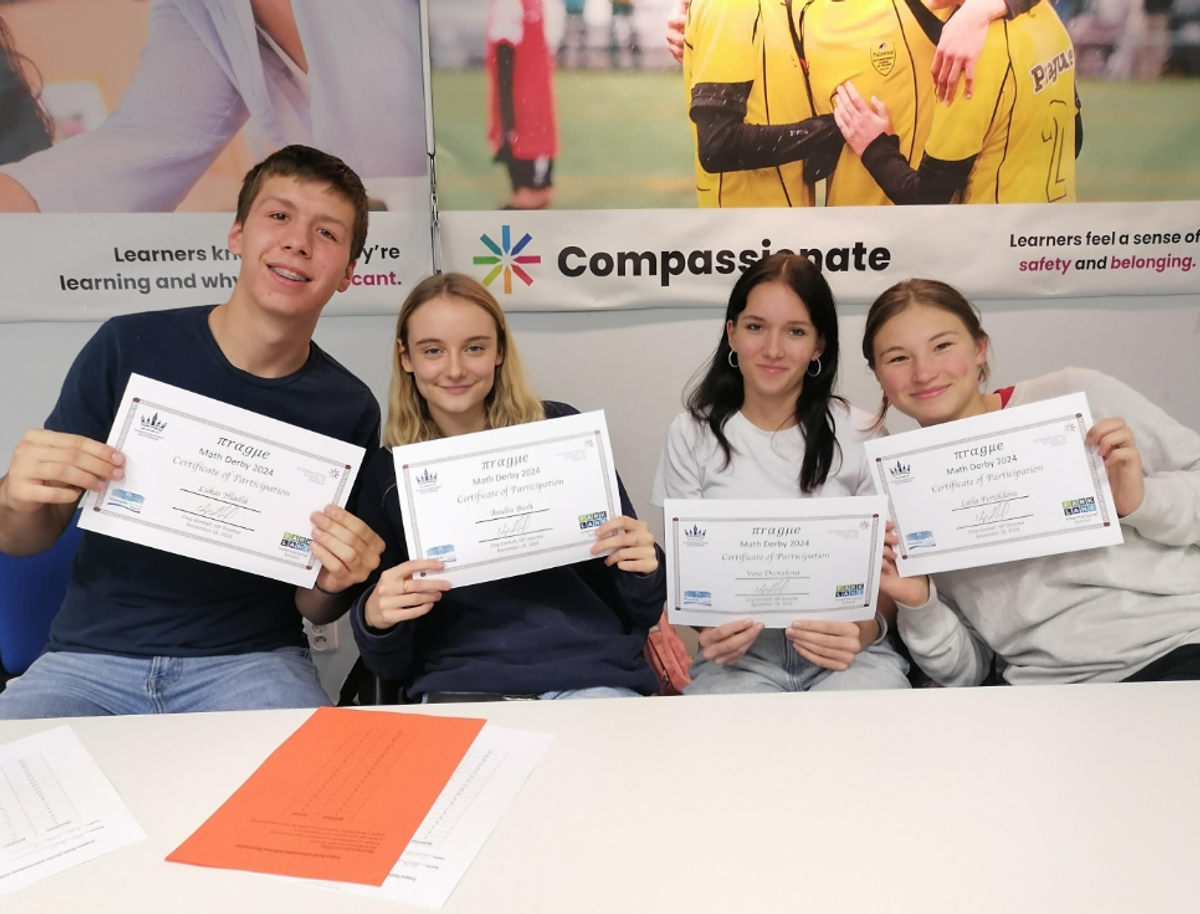

Gajus ze 3. ročníku popsal soutěž jako „určitě dobrý způsob, jak strávit večer“ a řekl, že i když nemáte moc zkušeností se soutěží, vše stojí za vyzkoušení. Mai (také 3. ročník) píše, že matematická soutěž v ISP jí ukázala, jak je týmová práce pro skupinové úlohy klíčová. U některých cvičení byla týmová spolupráce nutná k jejich dokončení. Bez toho to nešlo. Zadané úkoly umožnily propojit mysl studentů a řešení bylo založené na logice. Celkově soutěž určitě stála za účast!
Studenti 3. ročníku
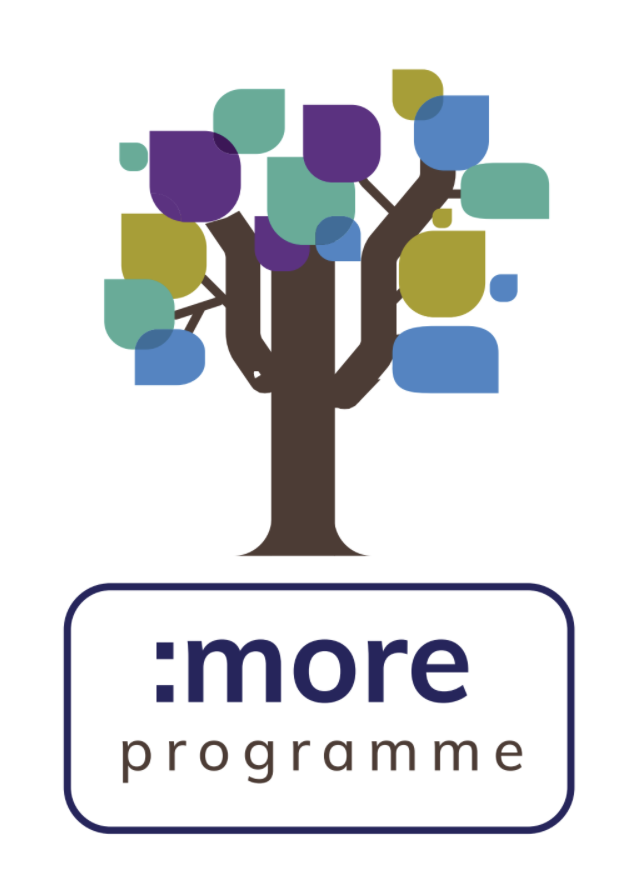

On November 15th, Maxine, Tereza (Year 5 students), Nika, Věra (Year 4 students), and I, organized a poetry evening, continuing an already established CAS project. The event was also listed in the program of a nationwide ,,Den poezie” festival. The poetry evening took place in the Café AdAstra, a venue working closely alongside the ,,Zajíček na koni” foundation, which supports people with disabilities. The event raised over 3500 Kč, all of which was donated to this foundation.
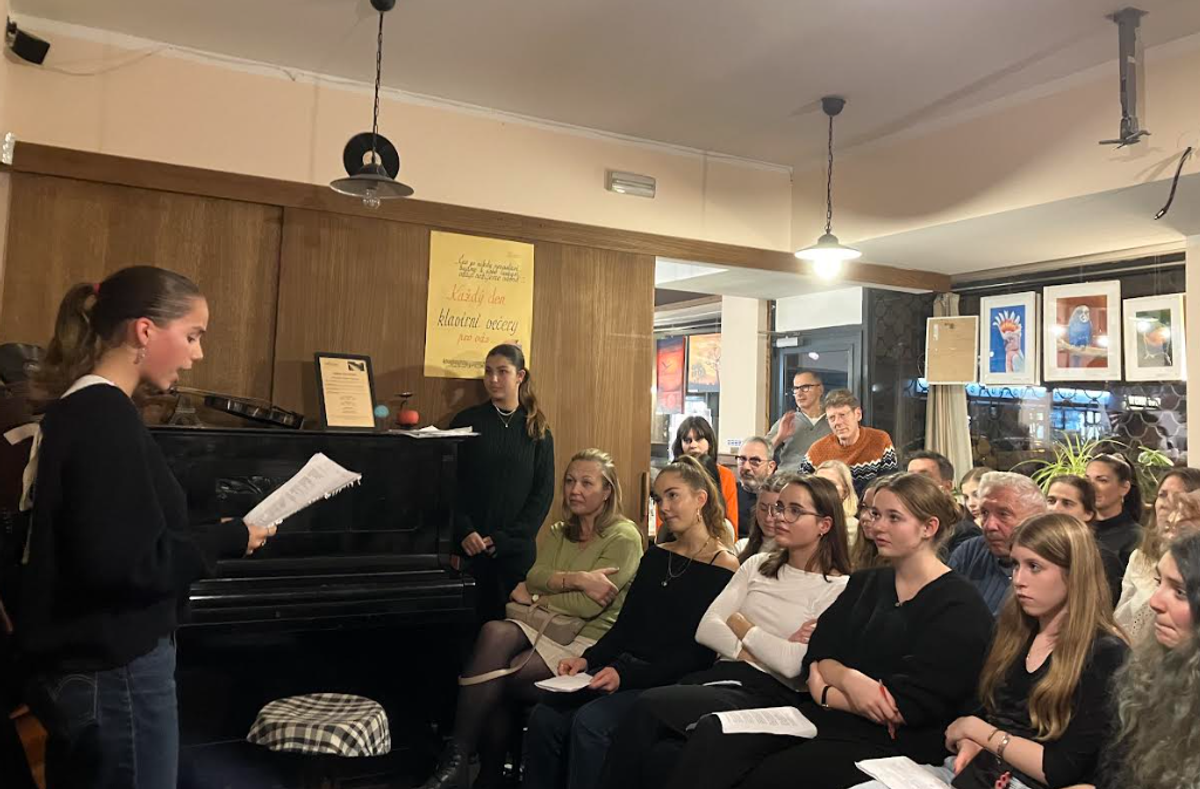

Organizing the poetry evening was quite a challenge for us, as it was our first time managing an event entirely on our own, from the initial planning stages to its successful realization. It taught us how to communicate effectively within our team of organizers, Ms. Švejdová, and the Café AdAstra itself. Ms. Švejdová suggested that we fill in a form to be listed on the program of the ,,Den poezie” festival, which was happening between the 13th and the 25th of November. The theme of this festival was ,,On the border of music”, therefore we incorporated music performances -piano, guitar, singing- into the program of the evening.
Although the theme of the evening was partially inspired by the theme of the ,,Den poezie” festival, we also wanted to support the contributions of women in the arts. Throughout the evening, in between the performances, we briefly introduced five women poets and their work. Many of the students who participated read or sang their own authorial texts, which also provided a great insight into the themes and inspirations that drive authors to create poetry and songs.
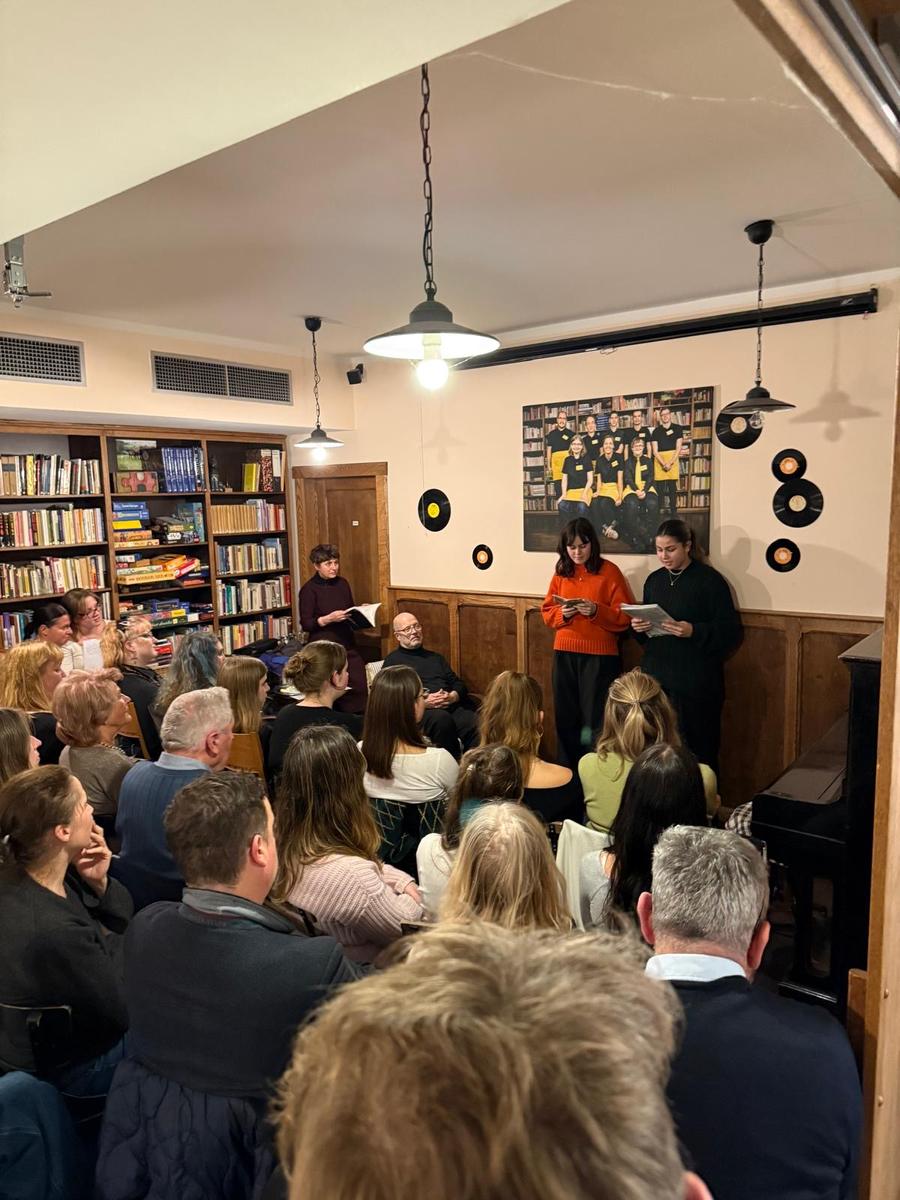

The whole poetry evening had a supportive and pleasant atmosphere created by the welcoming space in which the event took place, the participants and audience alike. Many teachers, family members, and friends came along to listen to the poems and songs throughout the evening, making the event enjoyable for everyone. We have received a lot of positive feedback on the organization and execution of the event, which we have greatly appreciated. The poetry evening provided a great opportunity for many young people to come together and share their passion for poetry by either reading their own authorial poem, or supporting other women in literature.
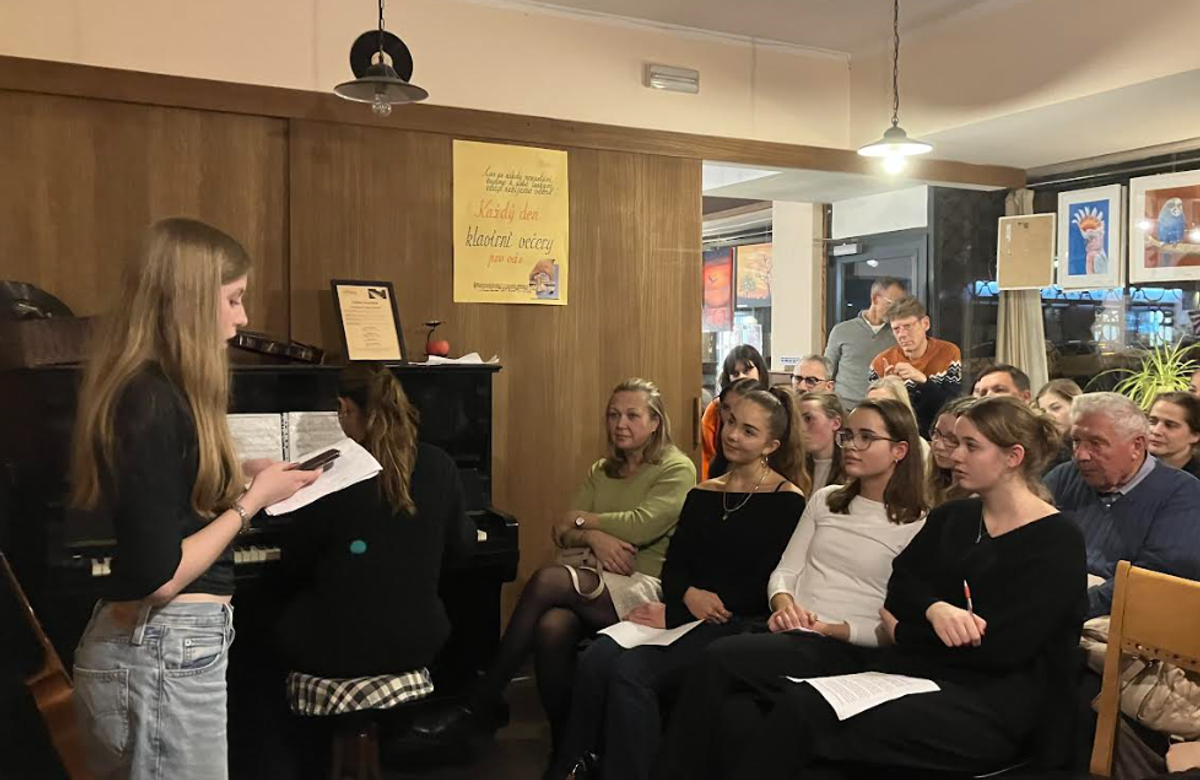

15. listopadu jsme s Maxine, Terezou (studentky 5. ročníku), Nikou a Věrou (studentky 4. ročníku) zorganizovaly večer poezie, který pokračoval v již každoročně zavedeném CAS projektu. Akce byla zároveň zařazena do programu celonárodního festivalu „Den poezie“. Večer poezie se konal v kavárně AdAstra, což je prostor úzce spolupracující s nadací „Zajíček na koni.“ Tato nadace podporuje osoby se zdravotním postižením. Během večera se podařilo vybrat více než 3500 Kč, které byly v plné výši darovány této nadaci.
Organizace večera poezie pro nás byla velkou výzvou, protože to bylo poprvé, co jsme samostatně připravovaly akci od jejího plánování až po její úspěšnou realizaci. Tato zkušenost nás naučila efektivně komunikovat jak mezi sebou v týmu organizátorů, tak i s paní Švejdovou a kavárnou AdAstra. Paní Švejdová nám doporučila vyplnit přihlášku, aby byl večer zařazen do programu festivalu „Den poezie“, který probíhal od 13. do 25. listopadu. Tématem tohoto festivalu bylo „Na hrázi hudby“, a proto jsme do programu večera zařadily i hudební vystoupení - klavír, kytaru a zpěv.
I přesto, že téma večera bylo částečně inspirováno tématem festivalu „Den poezie“, chtěly jsme také podpořit tvorbu žen v umění. Během večera jsme mezi vystoupeními stručně představily pět básnířek a jejich tvorbu. Mnozí studenti, kteří se akce zúčastnili, četli nebo zpívali i své vlastní autorské texty, což zároveň přineslo zajímavý pohled na témata, ze kterých autorky čerpají inspiraci ke tvorbě vlastních básní a písní.
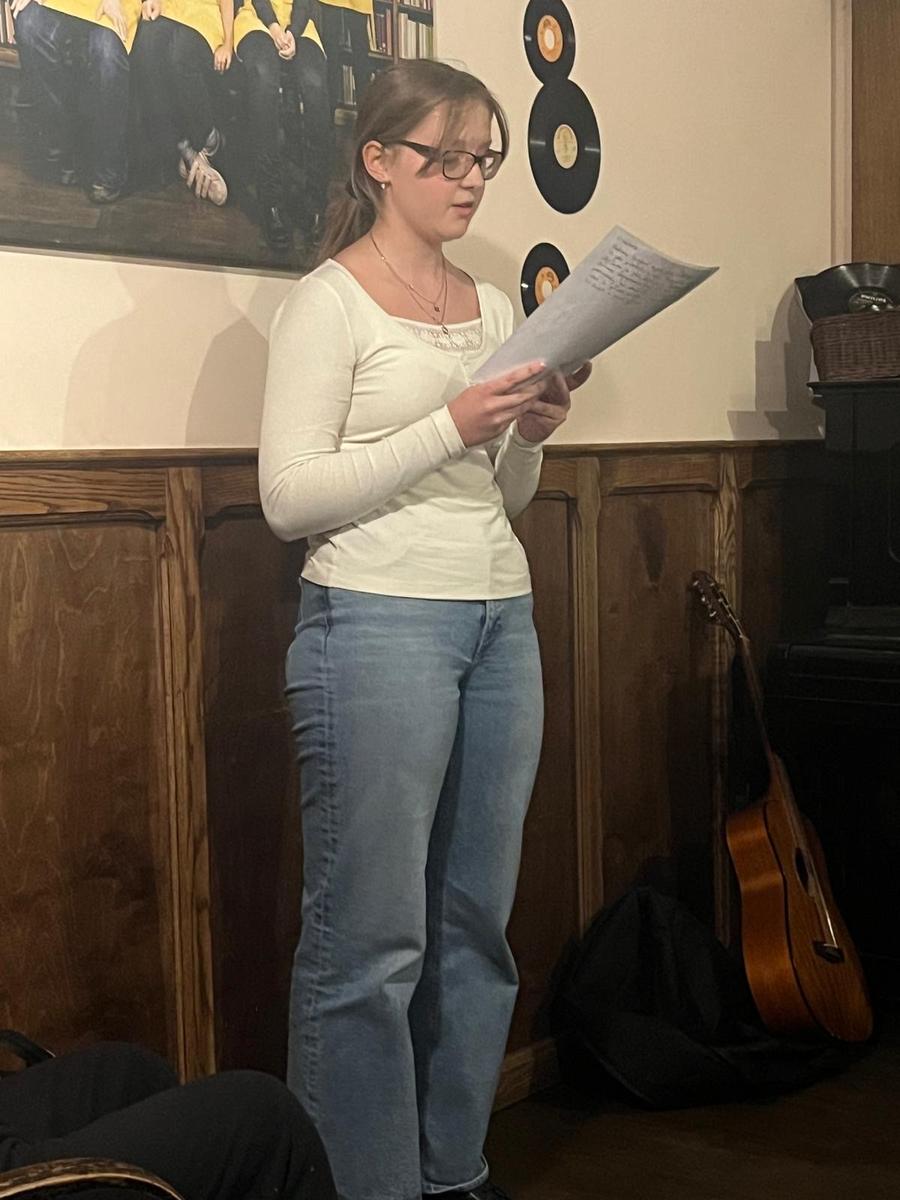

Celý večer poezie navodil mezi účastníky i publikem příjemnou atmosféru, kterou vytvořil přívětivý prostor kavárny AdAstra. Na akci přišlo mnoho učitelů, rodinných příslušníků a přátel, aby si poslechli básně a písně, což přispělo k ještě lepšímu zážitku pro všechny zúčastněné. Získaly jsme mnoho pozitivní zpětné vazby na organizaci a průběh večera, za což jsme velmi vděčné. Večer poezie poskytl mnoha mladým lidem příležitost sejít se a sdílet svou vášeň pro poezii, ať už prostřednictvím čtení vlastní autorské tvorby, nebo podpory ostatních žen v literatuře.
Gabriela Popiolková, 5. ročník


ECP students made charity donations of 8.000 czk to Doctors without Borders and 8.000 czk to UNICEF organisations. The money was collected during the ECPMUN Conference where students were selling T Shirts.
Studenti ECP věnovali příspěvky ve výši 8 000 Kč Lékařům bez hranic a 8 000 Kč organizacím UNICEF. Peníze byly vybrány během konference ECPMUN, kde studenti prodávali trička.